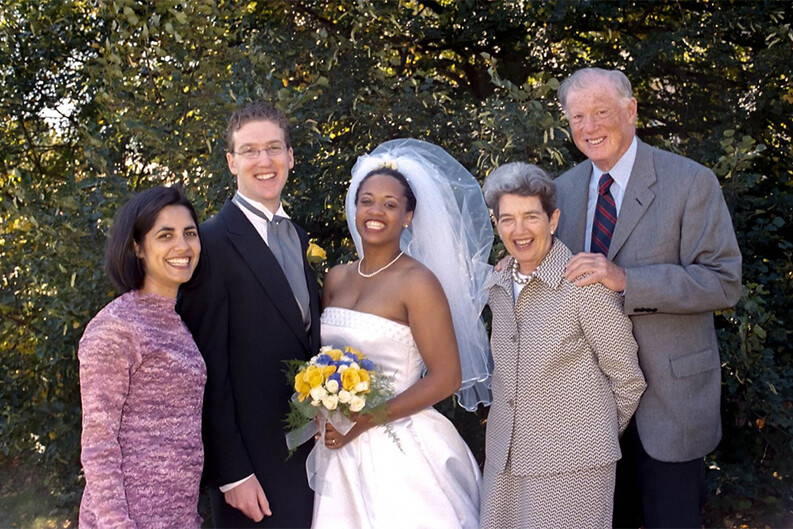Bob Bernstein’s “Rangers”

Ahadi Bugg-Levine ’98, Noah Novogrodsky ’97, and Jeffrey Prescott ’97 reflect on their relationship with Robert Bernstein (1923–2019)
Twenty-five paragraphs into the moving obituary4 of Robert Bernstein in the New York Times, a single sentence notes that “law school fellowships on human rights in Mr. Bernstein’s name were established at Yale and New York University.” This was the moment we stepped into Bob’s remarkable life. Our own lives would change profoundly as a result. We were the very first recipients of the Robert L. Bernstein Human Rights Fellowships at Yale Law School. Bob took us under his wing at the earliest stage of our careers, at what was supposed to be the twilight of his own—a period that, for him, was anything but retirement (retiring is probably the last word anyone would use to describe Bob) and stretched long enough that this past April he welcomed the twenty-first class of Bernstein fellows to “join the Bernstein family.”
Being a Bernstein fellow meant not only devoting a year or more to seeking an innovative or creative approach to human rights advocacy, but also becoming one of the thousands of people young and old whom Bob delighted in mentoring, charming, occasionally hectoring, and often engulfing — a fresh audience for his jokes, fresh recruits for his ever-multiplying campaigns to improve the world.
Each year, the Bernstein fellows assemble for a symposium to tackle a seemingly impossible problem of human rights, welcoming the newest additions to our ranks. Nearly every year Bob joined in person, barraging us with questions about our work and about our lives, enlisting us to help a dissident’s family get settled or to support a new organization, celebrating our victories and offering solace — or chiding us, as needed — when we fell short. Bob's curiosity was boundless. He acted like he could have talked to us for years — and sometimes it felt that way. But he also clearly enjoyed watching us leave the nest, finding our own causes to champion. “There’s no limit to what you can achieve if you don’t care about taking the credit,” he liked to remind us. But the pleasure he took in being Bob Bernstein was a testament to the rewards of a life of purpose and conviction, the way of the Happy Warrior.
Chief among those rewards was the family of allies and admirers that Bob, Helen and his children wove into their own. They attended our weddings, showed up for our conferences, always asked to see another baby picture, and often checked to make sure we were happy in our jobs. Bob liked to use his wife Helen’s phrase, “inter-digitated,” to describe the connections between and among us and the wider world he was sending us out to serve. One felt in the force of his embrace limitless support and weighty expectations.
Bob used his privilege, networks, and resources to amplify the voices of those who struggle against oppression and injustice. Now that he has left us, we urge our fellow alumni in similar positions to fill the void and invest in human rights and the activists who struggle to help empower communities locally and all over the world.
Harold Hongju Koh, the former dean of Yale Law School, has begun many a Bernstein symposium by describing the opening credits of the “The Tales of the Texas Rangers” he watched on TV as a child. “The TV show would start and one Texas ranger would march into the street and start walking toward the camera, all alone” Harold would say, “And then suddenly behind him there were two and then there were four…” until the screen filled with rangers surging down the road. We’ll never catch up with Bob — his giant chapter in our lives was just one short sentence in his — but we are humbled to have been among the many people lucky enough to walk by his side.
See this tribute featured5 with other reflections on Bob’s life from Bernstein fellows.


